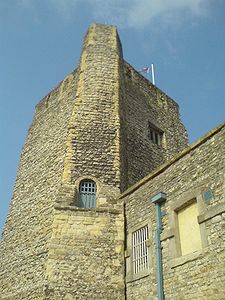Oxford Prison
| Oxford Castle | |
|---|---|
| Oxfordshire, England | |

St George's Tower, Oxford Castle
|
|
| Coordinates | 51°45′06″N 1°15′48″W / 51.7517°N 1.2632°WCoordinates: 51°45′06″N 1°15′48″W / 51.7517°N 1.2632°W |
| Grid reference | grid reference SP509063 |
| Type | Shell keep and bailey |
| Site information | |
| Owner | Oxfordshire County Council |
| Condition | Ruined, elements used as a hotel |
| Site history | |
| Materials | Coral rag and gravel |
Oxford Castle is a large, partly ruined Norman medieval castle on the western side of central Oxford in Oxfordshire, England. Most of the original moated, wooden motte and bailey castle was replaced in stone in the 11th century and played an important role in the conflict of the Anarchy. In the 14th century the military value of the castle diminished and the site became used primarily for county administration and as a prison.
Most of the castle was destroyed in the English Civil War and by the 18th century the remaining buildings had become Oxford's local prison. A new prison complex was built on the site from 1785 onwards and expanded in 1876; this became HM Prison Oxford.
The prison closed in 1996 and was redeveloped as a hotel. The medieval remains of the castle, including the motte and St George's Tower and crypt, are Grade I listed buildings and a Scheduled Monument.
According to the Abingdon Chronicle, Oxford Castle was built by the Norman baron Robert D'Oyly the elder from 1071–73. D'Oyly had arrived in England with William I in the Norman Conquest of England in 1066 and William the Conqueror granted him extensive lands in Oxfordshire. Oxford had been stormed in the invasion with considerable damage, and William directed D'Oyly to build a castle to dominate the town. In due course D'Oyly became the foremost landowner in Oxfordshire and was confirmed with a hereditary royal constableship for Oxford Castle. Oxford Castle is not among the 48 recorded in the Domesday Book of 1086, but not every castle in existence at the time was recorded in the survey.
...
Wikipedia

